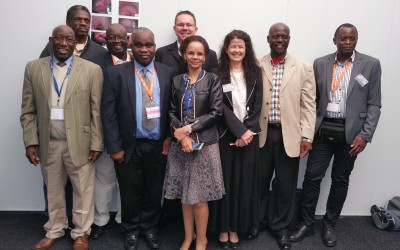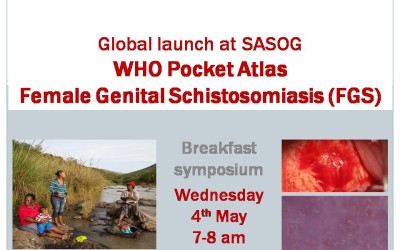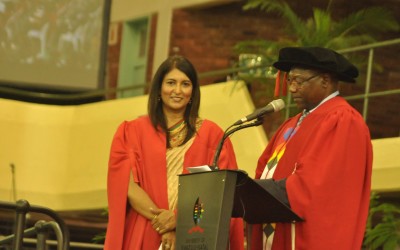Press
A core objective of BRIGHT Academy is to share our results, progress, and to increase the knowledge about Bilharzia.
In order to see the latest news about BRIGHT Academy: News section
Do you want to know what we are doing?
Follow us on Twitter.
A collection of high resolution downloadable photographs of the people of BRIGHT and our work can be found in our photo gallery.
For more questions please contact our communication officer:
Ida Amelie Mayes: [email protected]
South Africa no: (+27) 76 692 819
Norwegian no: (+47) 906 56 702
Follow on social media
Although the situations portrayed on this website are typical of the research none of the persons in this website are research patients (study participants). None of the persons portrayed in the treatment and investigative situations are minors. They have kindly given their permissions to publish the images.
Kinldy credit photographer Håvard Holme.
FGS introduced to gynaecologists
The WHO Pocket Atlas for Female Genital Schistosomiasis (FGS) was launched at the Congress for South African Society for Obstetricians and Gynaecologists (SASOG 2016). The South African Centre for Disease Control was represented by Dr Patrick Hlungwani. Furthermore, Dr Lester Chitsulo, parasitologist and former WHO leader for Bilharzia work presided over the launch together with gynaecologists from several countries. From left to right: Gynaecologist Francis Hyera, University of Limpopo, Department of Public Health Medicine, South Africa. Gynaecologist Roland Eddie Mhlanga, Mpumalanga Provincial Specialist Obstetrics and Gynaecology, South Africa. Dr Lester Chitsulo, Malawi. Gynaecologist Bellington Vwalika, University Teaching Hospital, Zambia. Professional Nurse Deon Bezuidehout, Clinical Research, Merck, South Africa. Gynaecologist Motshedisi Sebitloane, Nelson Mandela School of Medicine,University of KwaZulu-Natal, South Africa. Dr Eyrun F Kjetland, Research Fellow, Nelson Mandela School of Medicine/Norwegian Centre for Imported and Tropical Diseases. Mr Patrick Hlungwane, Communicable Disease Control, National Department of Health, South Africa. Gynaecologist Sibone Mocumbi, Maputo Central Hospital,... read moreGlobal Launch at SASOG
At the Congress for South African Society for Obstetricians and Gynaecologists – there will be a global launch of the WHO Pocket Atlas for Female Genital Schistosomiasis (FGS). Statement: Female genital schistosomiasis (FGS) is recognised as a gynaecological complication of schistosomiasis (Bilharzia) affecting approximately 150 million females globally. There are no point-of-care laboratory tests for diagnosis. Key to diagnosis is visualization of the lesions by a trained health professional. Visualisation is enhanced with a digital camera and screen, or with a colposcope if available. Different forms of lesions include grainy sandy patches, homogeneous yellow sandy patches, rubbery papules and abnormal blood vessels. This pocket atlas aims to assist clinicians to recognise the lesions and manage the patients. Administration of Praziquantel (single dose) prevents new lesions and morbidity. This is supported by the World Health Assembly Resolution 54.19 which calls for “treatment of clinical cases and groups at high risk of morbidity, such as women and children”. The working group recommends that all health workers in schistosomiasis endemic areas who are attending to females should consider the diagnosis of female genital schistosomiasis. There is a biological plausibility of a link between FGS and the acquisition of HIV and HPV. A comprehensive history should be taken to identify other cases at risk, girls especially, and suspected cases should be treated with... read morePhD in Female Genital Schistosomias
The examiners of Dr Pavitra Pillay’s PhD thesis wrote: “I am highly impressed with the excellent quality…. this work is of vital importance for South Africa and should be heard by anybody interested cervical cancer”. “The studies have been well planned and the candidate has done very nice and solid scientific work.” In her thesis Dr Pillay has shown how schistosomiasis can be a potential risk factor for the acquisition cervical squamous cell atypia and HIV. It is recommended that regular mass drug administration for schistosomiasis is implemented and public health interventions raising awareness of cervical cancer are instituted targeting young women and men in endemic populations. Title: “Female genital schistosomiasis (FGS) is a potential risk factor for squamous cell atypia and HIV among young women from schistosomiasis endemic populations” PhD registered: University of KwaZulu-Natal (UKZN), South Africa Main supervisor: Professor Myra Taylor, UKZN Co-supervisors: Dr Eyrun F Kjetland, Oslo University Hospital, Norway/UKZN and Professor Lisette van Lieshout, Leiden University Medical Centre, The Netherlands Other supervisor: Professor Borghild Roald, University of Oslo, Norway ... read moreNo Results Found
The page you requested could not be found. Try refining your search, or use the navigation above to locate the post.



